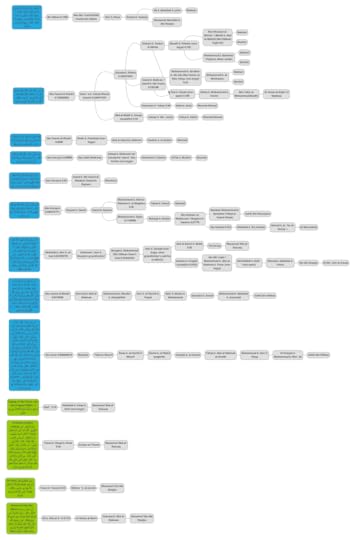Women may travel without a mahram for three days and nights: A study of the hadiths
There are numerous authentic hadiths that mention restrictions on women traveling without a mahram (a relative like a husband or father). I was recently asked about the exact nature of the restriction, so I decided to do a thorough hadith study using the probabilistic hadith verification method. For those who want the conclusion immediately: the opinion I prefer is that women should be permitted to travel without a mahram if the journey is under three days and nights (72 hours). Also note that some scholars, such as al-Baji, believe that this restriction only applies to young women, not elders.
Below is a diagram of the result of my study, which includes all the hadiths I found with their chains:

Below is a listing of the relevant contents of the hadiths, arranged from the most reliable to the least reliable, along with the Companions they came from and the hadiths’ probability of authenticity. Note that all of these hadiths are considered sahih or authentic by hadith scholars despite their divergent contents:
Abu Hurayra 36%: No woman should travel more than the distance of a day’s and night’s journey without a mahram. (Muwatta)Abu Saeed al-Khudri 13.82%: No woman should travel “more than three nights” without a mahram. (Bukhari, Muslim, Bayhaqi, Musnad Ahmad)Ibn Abbas 12.96%: Women can only go on hajj if they have a mahram with them. (Bukhari and Musannaf Abu Bakr b. Abi Shayba)Abu Hurayra 9.35%: No woman should travel more than a day without a mahram. (Musnad Ahmad, Sahih Ibn Khuzayma, al-Mustadrak)Abu Saeed al-Khudri 6.48%: No woman should travel without a mahram. (Musnad Ahmad)Abu Hurayra 3.88%: No woman should travel more than the distance of a three-day journey without a mahram. (Musnad Ahmad)Abdullah b. Amr b. al-Aas 3.20%: No woman should travel more than the distance of a journey of three [days and nights] without a mahram. (Musannaf Abd al-Razzaq, al-Mujam al-Awsat)Abu Saeed al-Khudri 2.80%: No woman should travel for more than three days without a mahram. It mentions Ayesha saying “Not all woman have mahrams.” (Sahih Ibn Hibban)Ibn Umar 0.6%: No woman should travel for more than three [days and nights] without a mahram. (Sahih Ibn Hibban)
We can use probability theory to combine these authenticity scores as follows.
1−((1−0.36)×(1−0.1382)×(1−0.1296)×(1−0.935)×(1−0.0648)×(1−0.0388)×(1−0.032)×(1−0.028)×(1−0.006)) = 0.973765972
(0.36+0.1382+0.1296+0.935+0.0648+0.0388+0.032+0.028+0.006)÷9 = 0.192488889
(0.973765972+0.192488889)÷2 = 0.5831
The meaning is that there is a 58.31% probability of authenticity for the principle that there is some sort of restriction on women traveling without mahrams, but we don’t know yet what the restriction is. This is a very high probability because sahih starts at 30%. Anything above 60% is sahih al-sahih, meaning it is many times more authentic than the average sahih hadith you run into, and this score almost reaches that.
We can now combine the probabilities of only those hadiths whose contents the say the same things:
Abu Hurayra 36%: No woman should travel the distance of a day’s journey without a mahram.Abu Seed al-Khudri and Ibn Umar: 16.97%: No woman should travel for more than the duration of three days and nights without a mahram.Abu Hurayra 9.35%: No woman should travel for more than the duration of a day (and night?) without a mahram.Abu Hurayra and Abdullah b. Amr 7.02%: No woman should travel more than the distance of a three days’ and nights’ journey without a mahram.Abu Saeed al-Khudri 6.48%: No woman should travel at all without a mahram.
We can ignore Abu Saeed al-Khudri’s 6.48% hadith that says no woman should travel without a mahram because it is contradicted by his own more authentic hadith (13.82%, over twice as authentic) that says a woman shouldn’t travel longer than three nights without a mahram.
Besides hadiths, we also have athars, or sayings of the Companions and Successors, on this issue. Below is a listing of the ones I found:
Al-Hasan al-Basri 36%: No woman should travel for more than three [days and nights] without a mahram. (Musannaf Abd al-Razzaq)Ibn Shihab al-Zuhri 36%: Ayesha was told about Abu Saeed al-Khudri’s hadith that says women should only travel with mahrams, and she said “Not all women can find a mahram.” (Musannaf Ibn Abi Shayba)Ikrima the freedman of Ibn Abbas 21.6%: A woman should not travel for more than three [days and nights] without a mahram.Ibn Umar 18%: No woman should travel for more than three [days and nights] without a mahram. (Musannaf Abd al-Razzaq)
It seems to me that we have two choices now:
To rely on one Companion, Abu Hurayra, for his 36% authenticity hadith, which says that no woman should travel the distance of a day’s journey without a mahram.To rely on the three hadiths of Abu Seed al-Khudri and Ibn Umar, with a combined authenticity score of 16.97%, and the non-hadith sayings of al-Hasan al-Basri, Ibn Umar and Ikrima, with a combined authenticity of 42.02%, which say that no woman should travel more than the duration of three days and nights without a mahram.
To me personally the second option is far more attractive, due to it relying on three Companions and two highly respected successors (al-Hasan al-Basri and Ikrima, the most respected freedman of Ibn Abbas), and due to it making life easier. Since everything we are dealing with here is authentic, we might as well choose the easier authentic option that comes from many respected individuals.



